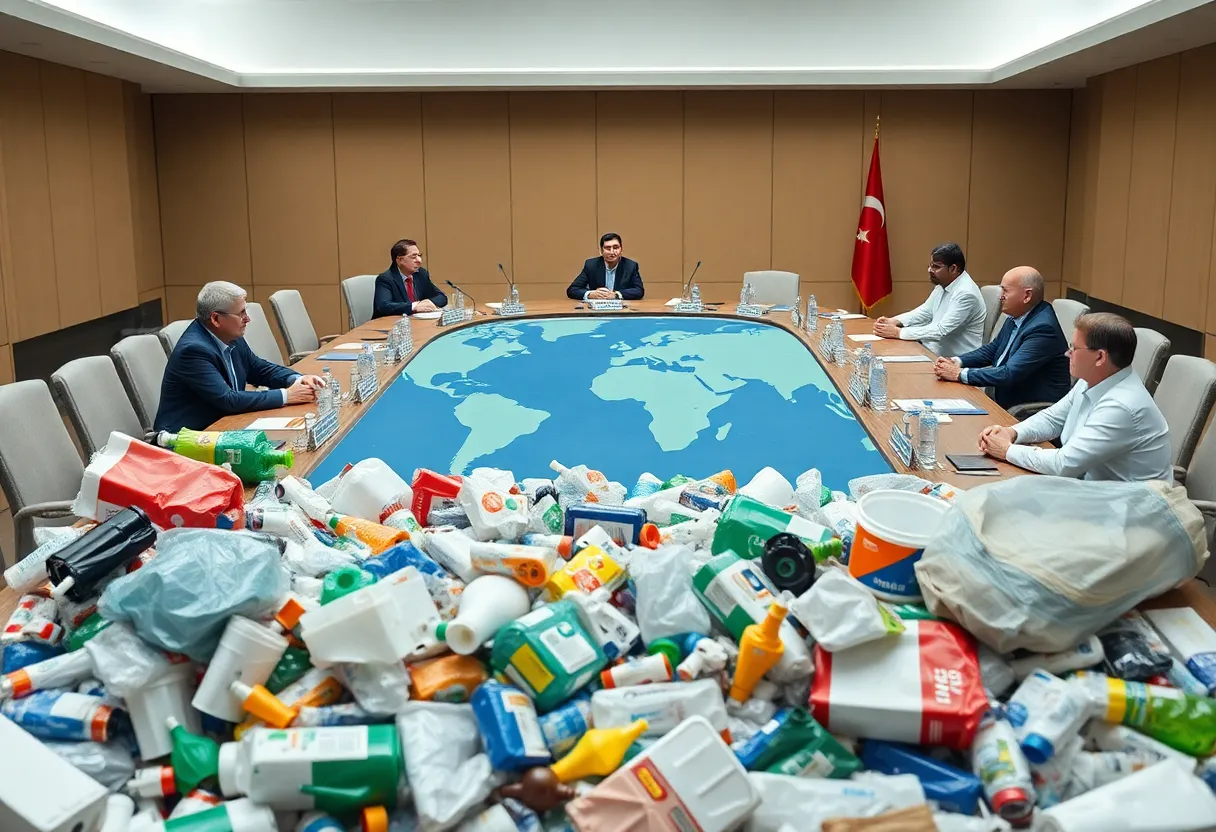News Summary
Negotiations for a legally binding treaty on plastics ended without agreement in Geneva, disappointing environmental advocates. Despite the involvement of 184 nations over two years, concerns over weak measures emerged, especially from civil society groups fearing vulnerable populations would be neglected. The draft treaty faced backlash for being seen as inadequate, highlighting a divide between nations focused on production restrictions and those favoring recycling. A call for transparency in negotiations comes as the health impacts of plastic pollution grow more alarming, pushing advocates to demand stronger legislation to combat this crisis.
Global Treaty Talks on Plastics Stumble in Geneva
The latest round of negotiations for a legally binding treaty on plastics in Geneva has ended without a solid agreement, much to the dismay of environmental advocates and affected communities. With representatives from 184 nations gathered, the discussions have been ongoing for over two years, yet they still seem stuck in the mud, unable to produce a satisfactory framework for managing the global plastic crisis.
Concern Over Weak Measures
As the talks unfolded, civil society groups voiced their fears, urging countries to hold firm and strive for a robust agreement. Their primary concern? The potential for vulnerable populations to be left behind in the rush to finalize a treaty. The fear is that if countries compromise too much, it could result in a deal that doesn’t adequately protect frontline communities who often bear the brunt of plastic pollution.
The Draft Treaty: A Disappointment?
This past Wednesday saw the unveiling of a draft treaty by chair Luis Vayas Valdivieso, which was met with swift backlash from around 80 countries. Many representatives derided the proposal as “unacceptable” and referred to it as a “toothless waste management instrument.” The draft called into question how serious the commitment to tackling the plastics crisis really is, with many arguing it was merely a reiteration of existing practices rather than a decisive step forward.
Production vs. Recycling: A Dilemma
Countries with ambitious environmental goals pushed for restrictions on plastic production, while oil-producing nations preferred focusing on recycling efforts and voluntary measures. This clash has highlighted a critical divide, with many feeling that the draft crossed crucial boundaries that oil and plastic producers were unwilling to accept.
A Call for Transparency
There is a growing sentiment that secrecy around negotiations may compromise the well-being of communities disproportionately impacted by plastic pollution. Many environmental groups noted the lack of meaningful and legally binding actions in the proposed draft, stressing that the health risks associated with plastics are too significant to ignore. A reported £1.1 trillion in annual health-related damages linked to plastic pollution emphasizes the urgency of the situation.
The Health Impact: A Grim Reality
A Lancet report suggested that plastic pollution is becoming a “grave, growing and under-recognized danger” to health, particularly endangering infants and children. As the negotiations moved closer to their final scheduled day, some delegates maintained a glimmer of hope for a significant treaty addressing these pressing health concerns.
Global Discontent with the Draft
The negotiations faced criticisms for failing to tackle the essential issues of plastic production and the toxic chemicals linked with it. Despite the push from around 100 nations for restrictions on production, many felt that the current framework merely reiterates the status quo without making any real progress. Countries like Canada, Tuvalu, and the European Union expressed their discontent, labeling the draft as lacking in robust action and insufficient to combat plastic pollution effectively.
Time Running Out for Agreements
As the clock ticked down, pressure mounted for the negotiators to find common ground. Chair Luis Vayas Valdivieso emphasized the need for countries to build bridges rather than remain entrenched in their positions. As the stakes continue to rise, the call for a strong, legally binding treaty becomes ever more crucial to protect our environment and ensure the health of future generations.
What Comes Next?
The outcome of these talks highlights the ongoing struggle to address a challenge that affects everyone. This latest round might have stumbled, but the persistent advocacy from environmental groups underscores the necessity of meaningful legislation in the fight against plastic pollution. With the talks now on thin ice, there is hope that nations can step back from the brink of a weak deal and pave the way for something truly effective.
Deeper Dive: News & Info About This Topic
- The Guardian: Global Treaty Talks on Plastics Stumble in Geneva
- Wikipedia: Plastic Pollution
- AP News: Plastic Pollution Treaty Negotiations in Geneva
- Google Search: Plastic Pollution Treaty
- Al Jazeera: No Agreement in Sight on UN Treaty
- Encyclopedia Britannica: Plastic Pollution
- AP News: Another Update on Plastic Pollution Treaty Negotiations
- Google News: UN Treaty on Plastic

Author: STAFF HERE PETERSBURG WRITER
The ST PETERSBURG STAFF WRITER represents the experienced team at HEREStPetersburg.com, your go-to source for actionable local news and information in St Petersburg, Pinellas County, and beyond. Specializing in "news you can use," we cover essential topics like product reviews for personal and business needs, local business directories, politics, real estate trends, neighborhood insights, and state news affecting the area—with deep expertise drawn from years of dedicated reporting and strong community input, including local press releases and business updates. We deliver top reporting on high-value events such as Grand Prix of St. Petersburg, Localtopia, and SHINE Mural Festival. Our coverage extends to key organizations like the St. Petersburg Area Chamber of Commerce and St. Pete Downtown Partnership, plus leading businesses in finance, manufacturing, and healthcare that power the local economy such as Raymond James Financial, Jabil, and Bayfront Health St. Petersburg. As part of the broader HERE network, including HEREJacksonville.com, HEREOrlando.com, HERETallahassee.com, and HERETampa.com, we provide comprehensive, credible insights into Florida's dynamic landscape.



